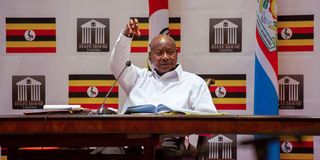Museveni announces campaigns mainly targeting rural voters

Ugandan President Yoweri Museveni at State House in Entebbe, Uganda, in 2018.
Ugandan President Yoweri Museveni has today announced plans for a series of campaigns just two days to the country’s presidential election, in what some see as an attempt to chip away at the popularity of his rivals ahead of the polls.
Museveni’s presidential campaign team on Monday said that the Ugandan leader will from today conduct radio and TV interviews as well as address the nation to persuade voters, largely in rural areas, to turn up in big numbers and vote.
The Ugandan leader, who faces growing opposition from the country’s youthful population led by Robert Kyagulanyi, popularly known as Bobi Wine, is banking on the country’s rural population – his key support base – to bolster his campaign and win him a sixth term in office.
“With just two days to the National Resistance Movement victory, I will conduct a radio/TV address this evening for the benefit of Buganda region,” Museveni’s campaign team said in a statement.
Hot contest
The run-up to the January 14 election, billed as one of the most hotly contested polls in the East African country, has been marred by violence and intimidation of opposition figures, the civil society and even journalists as Museveni – who has ruled the country for over three decades – fights to retain power amid growing opposition.
Last week, the country’s police chief Martin Okoth Ochola came under fire after he refused to apologise after police recently beat up journalists. He claimed the move by officers was to meant to protect journalists from harm and danger.
“You are insisting you must go where there is danger. Yes, we shall beat you for your own sake to help you understand that you do not go there. Yes, we shall use reasonable force to ensure that you don’t go where there is a risk. Actually, I have no apology,” Mr Ochola said.
Hundreds of Bobi Wine supporters and members of civil society have also been arrested in recent months, drawing criticism from the international community and human rights groups.
Investigate attacks
In November, the International Press Institute called on Uganda to investigate police attacks on reporters.
Human Rights Watch, a watchdog based in New York, also said in November that Museveni’s government was using Covid-19 rules as a pretext to violate rights and crack down on the opposition and media.
The authorities have often accused Wine and his supporters of violating laws governing public order and Covid-19 restrictions on large gatherings.
Dismissed campaigns
Last Thursday, Museveni dismissed the campaigns by Wine and other opposition leaders as populist and without any agenda for Ugandans.
He likened them to those witnessed in countries such as Liberia.
“Some countries have voted for change out of excitement. In Liberia, the citizens voted for a famous footballer but it didn't take them even a year to regret. They say their leader has turned into a dictator and so many things they hoped for have not happened,” said Museveni.
“Many times, President Museveni has guided that politics and leadership isn't all about singing, No. It is about seeing the nation develop by boosting the economy, it is also about making sure that citizens are safe and a number of other important things that a head of State does,” his campaign team added.
Wine has likened Museveni’s leadership to that of present and past rulers known for their autocratic leadership and firm grip on power.
“We are supposed to be celebrating Independence but Ugandans have nothing to celebrate. President Museveni is very scared of the ideas that we represent. He believes by blocking us from communication, by stopping us from enjoying our rights, he is going to disempower us, he is going to demotivate us,” he said.





